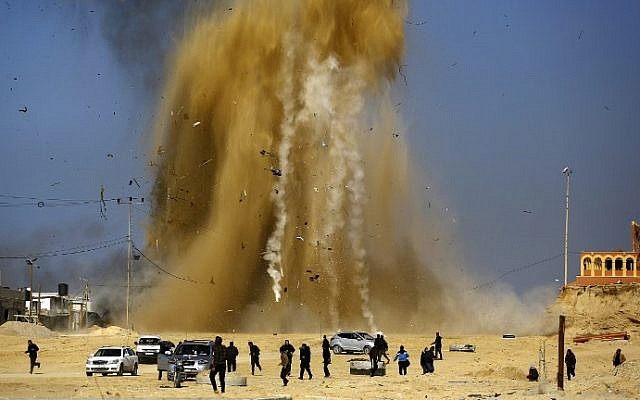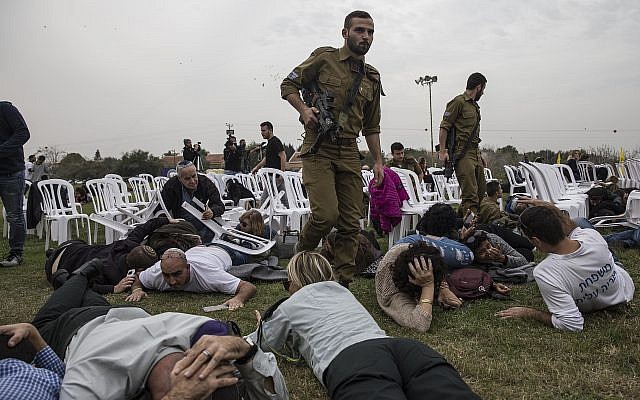Israeli jets on Saturday night carried out a second round of airstrikes in southern Gaza in retaliation for three mortar shells fired at Israel on Friday.
The Israeli Air Force struck a Hamas post in the coastal enclave, according to a statement from the IDF just before midnight.
Following the retaliatory raid, the army accused Iran of attempting to spark a war between Israel and Gaza terror groups and putting the lives of Palestinians in danger.

“The serious fire on Friday proved again that Iran, through rogue and extremist terrorist groups, is working to deteriorate the regional situation, is playing with the lives of Gaza residents, and may lead the Strip to an escalation [of hostilities] after years of quiet,” the IDF said.
Earlier on Saturday, Defense Minister Avigdor Liberman said the three mortar shells were supplied by Iran to terrorist groups in Gaza. He described the fire on Friday as a “grave act.”

Speaking to Hadashot News’ “Meet the Press,” Liberman said the Islamic Republic has supplied such weaponry to a number of terror groups in the Gaza Strip in the past, and therefore it was “too early” to identify the exact source of the shelling.
Friday’s shelling had targeted the Sha’ar Hanegev and Sdot Hanegev regions of southern Israel on Friday afternoon. Two of the mortar shells were intercepted by the Iron Dome missile defense system, while the third struck near a building in a community in the area, causing damage.
According to initial Israeli assessments, the barrage was not launched by the Hamas terror group, which controls the Gaza Strip, but by other terrorist organizations in the enclave. Israel holds Hamas responsible for all fire emanating from the Gaza Strip.
The Israel Defense Forces on Saturday night struck an observation post in southern Gaza belonging to the enclave’s ruling Hamas terror group, the IDF announced. It was the third such attack in 24 hours. Arab media reported the target was located in southern border town of Rafiah.
Late Friday night, Israeli artillery shelled two Hamas compounds in eastern Gaza. The Israeli Air Force bombed the same compounds.
All three attacks were carried out in response to the high trajectory rocket fire that was aimed at the Sha’ar HaNegev Regional Councils and Sdot Negev, the IDF said.
“The severe shooting on Friday proved once again that Iran, through rogue and extremist terrorist organizations, is acting to bring about a deterioration in the regional situation,” the IDF Spokesperson warned.
Iran is “playing with the lives of Gaza residents and is likely to lead the Gaza Strip to escalation after years of security calm,” the IDF Spokesperson added. “Hamas has full responsibility for the situation and its implications.”
Saleh Ali was one of 64,000 Syrian refugees living in the Netherlands. The vast majority, like Ali, are young men. And the largest number of these migrants spend their days idling in Amsterdam.
On Thursday morning, Saleh Ali took a walk to trendy Amstelveenseweg while wearing a keffiyah and waving a terrorist PLO flag. He stopped in front of a Jewish restaurant, shouted “Allahu Akbar” and began smashing the windows. The Amsterdam police stood by and watched quizzically until he was done. Then when he entered the restaurant, they finally called him out and arrested him.
And in two days he was back on the street.
Amsterdam is a very tolerant place. Not just of drugs or prostitution, but of Islamic violence.
Saleh Ali had lied about his past to get his temporary residence permit while claiming to be a refugee. He had combat training and had fought with Jihadists in and out of Syria. He told the police that he had been prepared to die in the attack on the restaurant and that he will continue engaging in violence.
But this information was kept secret until an anonymous source in the police department leaked it. The lawyer for HaCarmel, the restaurant that had been assaulted by the Islamic terrorist, issued a statement expressing outrage that the attacker who had pledged to commit more attacks was back on the street.
“It is incomprehensible and shocking that this man with a terrorist background, who claims to be prepared to commit violence, has been released,” wrote Herman Loonstein, a lawyer and Jewish civil rights activist. He warned that the attacker poses “a serious danger to society.”
And the prosecutor’s office took immediate action by filing a complaint against the restaurant’s lawyer. The Chief Officer of the Public Prosecution Service objected that, “sharing of information from the police interrogation report is ’inappropriate’". It’s inappropriate because it revealed that Saleh Ali should never have been in the Netherlands and that the authorities had stood around watching while a trained terrorist attacked a Jewish restaurant and then let him go even after he vowed to launch further attacks.
While the prosecutors went after the restaurant for exposing the terrorist past of the attacker, the attacker was headed back to court for an appearance before a three-judge panel.
Saleh Ali wore camouflage to court. According to Matthys van Raalten, a conservative commentator, he told the court that, “he feels like a volcano that is waiting to erupt”. He had already informed an officer that “the attack on the kosher restaurant was only the “first step” and that a next step would come.
He refused to discuss what the next step would be.
So, of course, they let him go a second time.
“If we assume that this person is a danger to society, we will not just put this person on the street,” the Public Prosecution Service claimed. But what more could Saleh Ali possibly do to prove he’s a danger to society?
The Netherlands, like many European countries, has welcomed in Syrian refugees and other Muslim migrants. And then it’s done its best to cover up the violence that they brought with them.
Amsterdam’s authorities have behaved the way that the Cologne police did after the mass migrant sexual assaults on New Year’s Eve. The police did little to stop them and the authorities denied everything. It was only when police sources leaked the truth about the assaults that the authorities were forced to put on a show of doing something. And that’s just as true in Amsterdam and across Europe.
European governments would rather tolerate terrorists than fight them. The No-Go Zone isn’t just a place; it’s a state of mind. The No-Go Zone is anywhere that Islamic supremacism is asserted with no meaningful resistance from law enforcement. The No-Go Zone can appear at any moment near you.
It can be a Jewish restaurant in a trendy Dutch neighborhood or New Year’s Eve celebrations outside a German cathedral. It’s anywhere that Muslim violence is tolerated and protected from criticism.
Saleh Ali and all his fellow colonists know that the European authorities can’t and won’t resist them. Because they would rather tolerate terrorists than tolerate those who tell the truth about Islam.
No comments:
Post a Comment